News & Stories
2019
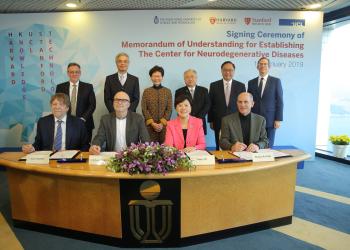
News
Fighting Neurodegenerative Diseases
The Hong Kong University of Science and Technology (HKUST) signed a landmark Memorandum of Understanding (MoU) together with Boston Children’s Hospital – a Harvard Medical School Teaching Hospital (Harvard), the Paul F. Glenn Center for the Biology of Aging at Stanford University School of Medicine (Stanford), and University College London (UCL) today, signifying a partnership to engage in advanced translational neuroscience research.
The momentous occasion was witnessed by The Hon Mrs. Carrie LAM Cheng Yuet-Ngor, Chief Executive of the Hong Kong Special Administrative Region (HKSAR); Mr. Andrew LIAO Cheung-Sing, Council Chairman of HKUST; Prof. Wei SHYY, President of HKUST; Mr. Nicholas W YANG, Secretary for Innovation and Technology; and diplomatic representatives including Mr. Andrew HEYN, British Consul General in Hong Kong.
2018
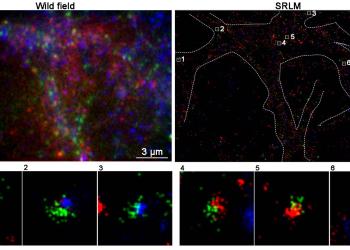
News
HKUST Scientists Reveal How Human Brains Keep Balance
An interdisciplinary team of scientists from The Hong Kong University of Science and Technology (HKUST) has discovered the mechanism of how human brains turn on and off neuronal activities, providing an important foundation to understand a wide range of neurologic conditions such as epilepsy, Parkinson's disease and ataxia-telangiectasia diseases.
“As with all things in life, healthy brain function depends on a balance of neuronal activities. We think of our brains as active - moving a leg and saying a word are all "active" events, but it is just as important that our brains be able to stop these actions,” said Cheng Aifang, a postgraduate student from the Division of Life Science who made the discovery under the guidance of the division’s head and Chair Professor Karl Herrup. “Yet it was not clear how our brains actually perform this go/stop function until now.”
2017
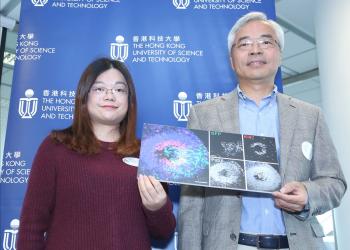
News
Awards-winning HKUST Neuroscientist Discovers Mechanism of Schizophrenia
A research team led by awards-winning neuroscientist and structural biologist Prof Zhang Mingjie of the Hong Kong University of Science and Technology (HKUST) has recently reached a breakthrough unveiling the fundamental mechanism that causes schizophrenia and other serious psychiatric conditions. Such discovery may potentially lead to the development of new treatments and drugs for the mental disorders. At present, there are about 40,000 diagnosed schizophrenic patients in Hong Kong [1].
2016
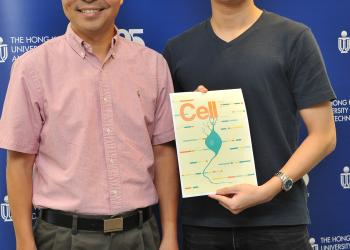
News
HKUST Researchers Find Possible Mechanisms of Human Brain Disorders That May Shed Light on New Treatments
A research team led by Prof Mingjie Zhang, Kerry Holdings Professor of Science of the Division of Life Science at The Hong Kong University of Science and Technology (HKUST), has achieved a breakthrough that provides mechanistic insights into the causes that lead to various neuropsychiatric disorders such as autism, intellectual disorders (ID) and schizophrenia. With their discoveries, new treatments for these disorders may be developed in near future.
All neurons in our brain are wired via a micron-sized connection unit called synapse, and each synapse contains a layer of densely-packed, protein-rich compartment called postsynaptic density (PSD), which is responsible for brain signal processing and transmission. While the existence of PSDs has been known to scientists for 60 years, how PSDs form and change in response to brain activities are poorly understood.
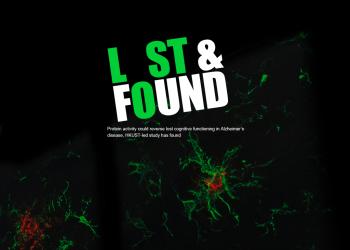
News
Lost and Found
HKUST researchers, collaborating with colleagues from Zhejiang University and the University of Glasgow, have found that the protein interleukin-33 (IL-33) reduces memory loss and other aspects of cognitive decline in conditions similar to Alzheimer’s disease (AD). With 46.8 million people around the world affected by AD and the number rising, the enormous burden on patients, their care-givers and health systems could soon be alleviated.
Mainly affecting the elderly, AD involves memory loss and impaired reasoning, judgment and movement. Research team leader Prof. Nancy Ip, Dean of Science, Director of the State Key Laboratory of Molecular Neuroscience and the Morningside Professor of Life Science, described the disease as an “urgent health threat”, particularly in Hong Kong with its rapidly aging population.

News
HKUST Dean of Science Prof Nancy Ip Elected to the American Academy of Arts and Sciences
Prof Nancy Ip, Dean of Science, The Morningside Professor of Life Science and Director of the State Key Laboratory of Molecular Neuroscience at The Hong Kong University of Science and Technology (HKUST), has been elected to the American Academy of Arts and Sciences as a Foreign Honorary Member.
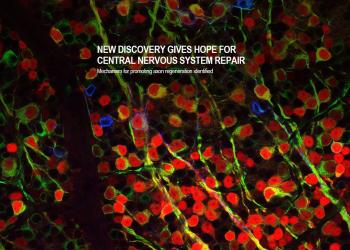
News
New Discovery Gives Hope for Central Nervous System Repair
HKUST scientists along with colleagues from the Institute of Neuroscience in Shanghai and Sun Yat-Sen University in Guangzhou have discovered a strategy for repairing injured neurons through the regeneration of axons, a normally rare occurrence. This raises the exciting possibility of reversing injuries to the central nervous system.
Led by Dr. Kai Liu, Assistant Professor at HKUST’s Division of Life Science, the team recently demonstrated that damaged optic nerves that transmit visual information from neurons in the eye to other neurons in brain could regenerate when treated with either an optical or a chemical stimulant. In mouse experiments they achieved this through the overexpression of both the light-sensing molecule melanopsin and that of Designer Receptor Exclusively Activated by Designer Drugs (DREADD), a tool normally used to enhance neuronal activity.
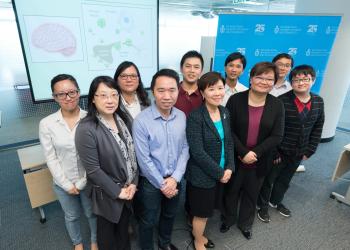
News
Breakthrough Discoveries at HKUST Offer New Hope for Treatment of Alzheimer's Disease
A research team led by scientists from the Hong Kong University of Science and Technology (HKUST) has discovered that a protein found in the human body could be potentially developed as an effective treatment for Alzheimer’s disease (AD).
The team, led by Prof Nancy Ip, Dean of Science, Director of the State Key Laboratory of Molecular Neuroscience and The Morningside Professor of Life Science at HKUST, in collaboration with Prof Eddy Liew from the University of Glasgow and Prof Baorong Zhang from Zhejiang University, has found that the protein interleukin-33 (IL-33) ameliorates cognitive decline and Alzheimer's disease-like pathology. The groundbreaking study was conducted at HKUST and the results have just been published in the prestigious scientific journal, Proceedings of the National Academy of Sciences USA (PNAS).






